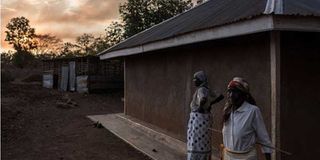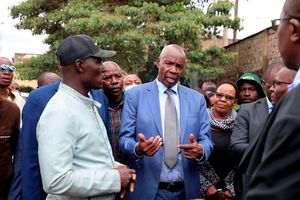Towards a world where everyone earns basic pay

Mary Abagi (left) and Margaret Abagi, two widowed sister-wives, hoped to pool their money with friends to start a small bank. PHOTO | NYT | Andrew Renneisen
What you need to know:
- As automation reduces the need for human labour, some Silicon Valley executives think a universal income will be the answer —and the beta test is happening in parts of the country.
- GiveDirectly wants to show the world that a basic income is a cheap, scalable way to aid the poorest people on the planet
The village is poor, even by the standards of rural Kenya. To get there, you follow a power line along a series of unmarked roads.
Eventually, that power line connects to the school at the centre of town, the sole building with electricity. Homesteads fan out into the hilly bramble, connected by rugged paths. There is just one working water tap, requiring many local women to gather water from a pit in jerrycans.
There is no plumbing, and some families still practice open defecation, lacking the resources to dig a latrine. There aren’t even oxen strong enough to pull a plow, meaning that most farming is still done by hand. The village is poor enough that it is considered rude to eat in public, which is seen as boasting that you have food.
In October, I visited Kennedy Aswan Abagi, the village chief, at his small red-earth home, decorated with posters celebrating the death of Osama bin Laden and the lives of African heroes, including JaKogelo, or “the man from Kogelo,” as locals refer to former US President Barack Obama. Kogelo, where President Obama’s father was born, is just 20 miles from the village, which lies close to the banks of Lake Victoria.
Abagi told me about the day his town’s fate changed. It happened during the summer, when field officers from an American non-profit called GiveDirectly paid a visit, making an unbelievable promise: They wanted to give everyone money, no strings attached. “I asked, ‘Why this village?’” Abagi recalled, but he never got a clear answer, or one that made much sense to him.

Erick Odhiambo (second left) with a fellow villager (right) and members of GiveDirectly team. PHOTO | NYT | Andrew Renneisen
The villagers had seen Western aid groups come through before, sure, but nearly all of them brought stuff, not money. And because many of these organisations were religious, their gifts came with moral impositions; I was told that one declined to help a young mother whose child was born out of wedlock, for example.
With little sense of who would get what and how and from whom and why, rumours blossomed. One villager heard that GiveDirectly would kidnap children. Some thought that the organisation was aligned with the Illuminati, or that it would blight the village with giant snakes, or that it performed blood magic. Others heard that the money was coming from Obama himself.
But the confusion faded that unseasonably cool morning in October, when a GiveDirectly team returned to explain themselves during a town meeting. Nearly all of the village’s 220 people crowded into a blue-and-white tent placed near the school building, watching nervously as 13 strangers, a few of them white, sat on plastic chairs opposite them. Lydia Tala, a Kenyan GiveDirectly staff member, got up to address the group in Dholuo.
She spoke at a deliberate pace, awaiting a hum and a nod from the crowd before she moved on: These visitors are from GiveDirectly. GiveDirectly is an NGO that is not affiliated with any political party. GiveDirectly is based in the United States. GiveDirectly works with mobile phones. Each person must have his or her own mobile phone, and they must keep their PIN secret. Nobody must involve themselves in criminal activity or terrorism. This went on for nearly two hours. The children were growing restless.
Finally, Tala passed the microphone to her colleague, Brian Ouma. “People of the village,” he said, “are you happy?”
“We are!” they cried in unison.
Then he laid out the particulars. “Every registered person will receive Sh2,280” — about $22 — “each and every month. You hear me?” The audience gasped and burst into wild applause. “Every person we register here will receive the money, I said Sh2,280! Every month. This money, you will get for the next 12 years. How many years?”
“Twelve years!”
Above is an excerpt of an article appearing in Sunday Nation. Get your copy for the whole story




